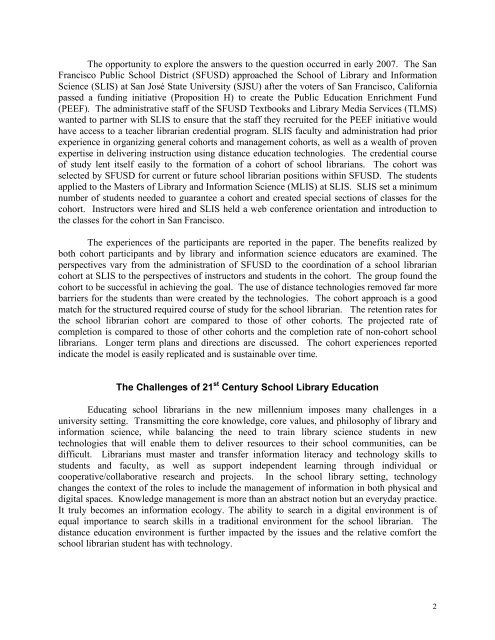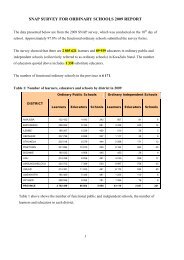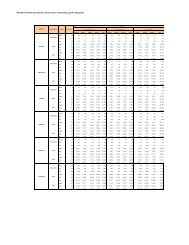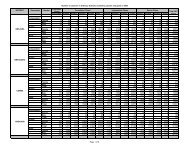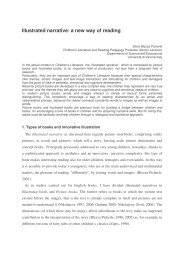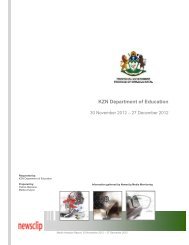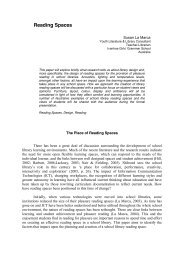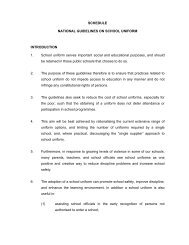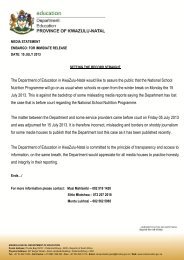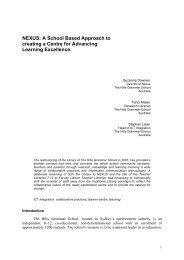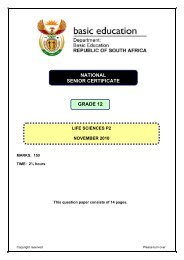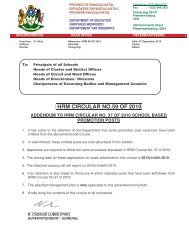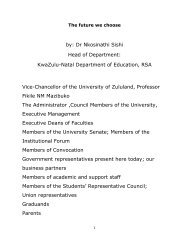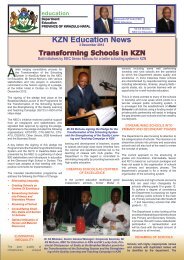Using Technology to Prepare World Class School Librarians to ...
Using Technology to Prepare World Class School Librarians to ...
Using Technology to Prepare World Class School Librarians to ...
Create successful ePaper yourself
Turn your PDF publications into a flip-book with our unique Google optimized e-Paper software.
The opportunity <strong>to</strong> explore the answers <strong>to</strong> the question occurred in early 2007. The San<br />
Francisco Public <strong>School</strong> District (SFUSD) approached the <strong>School</strong> of Library and Information<br />
Science (SLIS) at San José State University (SJSU) after the voters of San Francisco, California<br />
passed a funding initiative (Proposition H) <strong>to</strong> create the Public Education Enrichment Fund<br />
(PEEF). The administrative staff of the SFUSD Textbooks and Library Media Services (TLMS)<br />
wanted <strong>to</strong> partner with SLIS <strong>to</strong> ensure that the staff they recruited for the PEEF initiative would<br />
have access <strong>to</strong> a teacher librarian credential program. SLIS faculty and administration had prior<br />
experience in organizing general cohorts and management cohorts, as well as a wealth of proven<br />
expertise in delivering instruction using distance education technologies. The credential course<br />
of study lent itself easily <strong>to</strong> the formation of a cohort of school librarians. The cohort was<br />
selected by SFUSD for current or future school librarian positions within SFUSD. The students<br />
applied <strong>to</strong> the Masters of Library and Information Science (MLIS) at SLIS. SLIS set a minimum<br />
number of students needed <strong>to</strong> guarantee a cohort and created special sections of classes for the<br />
cohort. Instruc<strong>to</strong>rs were hired and SLIS held a web conference orientation and introduction <strong>to</strong><br />
the classes for the cohort in San Francisco.<br />
The experiences of the participants are reported in the paper. The benefits realized by<br />
both cohort participants and by library and information science educa<strong>to</strong>rs are examined. The<br />
perspectives vary from the administration of SFUSD <strong>to</strong> the coordination of a school librarian<br />
cohort at SLIS <strong>to</strong> the perspectives of instruc<strong>to</strong>rs and students in the cohort. The group found the<br />
cohort <strong>to</strong> be successful in achieving the goal. The use of distance technologies removed far more<br />
barriers for the students than were created by the technologies. The cohort approach is a good<br />
match for the structured required course of study for the school librarian. The retention rates for<br />
the school librarian cohort are compared <strong>to</strong> those of other cohorts. The projected rate of<br />
completion is compared <strong>to</strong> those of other cohorts and the completion rate of non-cohort school<br />
librarians. Longer term plans and directions are discussed. The cohort experiences reported<br />
indicate the model is easily replicated and is sustainable over time.<br />
The Challenges of 21 st Century <strong>School</strong> Library Education<br />
Educating school librarians in the new millennium imposes many challenges in a<br />
university setting. Transmitting the core knowledge, core values, and philosophy of library and<br />
information science, while balancing the need <strong>to</strong> train library science students in new<br />
technologies that will enable them <strong>to</strong> deliver resources <strong>to</strong> their school communities, can be<br />
difficult. <strong>Librarians</strong> must master and transfer information literacy and technology skills <strong>to</strong><br />
students and faculty, as well as support independent learning through individual or<br />
cooperative/collaborative research and projects. In the school library setting, technology<br />
changes the context of the roles <strong>to</strong> include the management of information in both physical and<br />
digital spaces. Knowledge management is more than an abstract notion but an everyday practice.<br />
It truly becomes an information ecology. The ability <strong>to</strong> search in a digital environment is of<br />
equal importance <strong>to</strong> search skills in a traditional environment for the school librarian. The<br />
distance education environment is further impacted by the issues and the relative comfort the<br />
school librarian student has with technology.<br />
2


